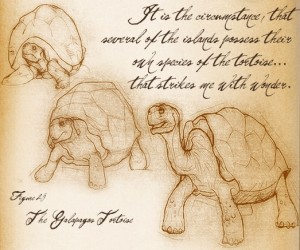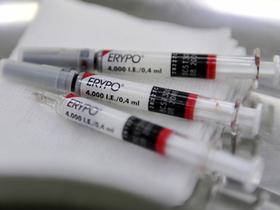Lance, Darwin and Uncomfortable Truths
By James Dziezynski
Charles Darwin didn’t have the luxury of Oprah Winfrey’s confessional couch when it came time to reveal the hard truths presented in his defining work On the Origin of Species. The implications of his scientific findings would come with an enormous cultural penalty, something the sharp-minded Darwin was well aware of. Despite cobbling together the first cohesive pieces of natural selection in the mid 1830’s it would be over twenty years before his world-changing theory would go to print in 1859.
Darwin had not stumbled upon truth, rather he had diligently uncovered it through a meticulous, analytic process of everything from ancient fossils to the lung capacity of flightless kiwi birds. He was in the know long before he went public. It took a series of events — debilitating ulcers, loss of faith, the death of his cherished daughter Annie, and of course the actual legwork of writing – before Darwin was comfortable enough to produce a direct, well-researched and comprehensive book that fulfilled his obligation as a scientist.
A century and a half later, a salivating media has lit their torches in pursuit of Lance Armstrong. The disgraced cyclist is poised to expose himself in the forgiving confines of Oprah’s mobile studio in an attempt that seems more focused on rejuvenating his relevance rather than purging his burdened soul of its anabolic sins. Indifferent scientific data said that it was rather unusual a man could naturally ride a bicycle this far, this fast and after years of ugly denial and strange legal proceedings, Armstrong will come clean.
What Darwin and Armstrong have in common is that unenviable twist of circumstance that made them spokesmen for uncomfortable truths.

Darwin was amazed at his findings. Armstrong probably felt the same way about the PEDs that made him superhuman.
Ironically, the lion’s share of Darwin’s data would be easily digested by the public, most of whom were only slightly tuned in to the cutting edge science of the 19th century. When it came to iguanas or tortoises, a process of constant improvement through heredity was a wonderful notion. It had already been in practice by breeders of livestock who had long known that mating the strongest, fullest beasts would ensure equally robust if not superior offspring. However, when this same theory was applied to humans, the uproar was vociferous. To reduce man to a lousy primate was to refute everything so divine and pure in being God’s favored beast.
Of course, there were a few voices, timid at first, who saw the validity of Darwin’s work. Any scientist who hoped to further biological research had to adapt themselves to Darwin’s theories – the evidence is overwhelmingly concrete. And yet as recently as 2006, only 13% of polled Americans fully buy into natural selection. A frustrating 45% report believing that the world is less than 10,000 years as reported in the Bible, while a further 41% believe that there is partial truth in Darwin’s theory but it was a benevolent Christian God who set it all in motion and that all creatures, man included, were introduced from the heavens more or less intact and recognizable as in present form.
Which brings us to Lance Armstrong.
The thinking, analytical people of the cycling world have known for over a decade that Armstrong was aided by pharmaceutical advances to achieve amazing results in the world’s most famous bike races. Riders by the dozens have admitted to various forms of enhancement (often in weepy confessionals after being busted), yet the one man who beat them all remained resolute in his proclamation of “never having failed a drug test”. This loaded statement became his rhetorical response, delivered like an automaton every time the question was raised.
Armstrong transcended the lower-tier world of cycling and became an American hero on the wings of his cancer awareness programs. Shielded by the ironclad taboo of criticizing a cancer survivor, Armstrong parlayed modern science into first bringing him back from the dead, then less nobly, thrashing the competition on the bike.
The uncomfortable truth that Lance is preparing to unload isn’t that he cheated in a bike race. Cycling has been the marquee sport for performance enhancing drugs for decades now, thanks to the fact that the physiology boosted by drugs neatly align with the skill set required to triumph on a $20,000 carbon fiber racing bicycle. The sport has flimsy integrity all on its own, regardless of Armstrong. Add to that a bumbling and seemingly inept series of checks and balances. It made beating the system akin to sneaking a file in a cake past the Keystone Cops. The truth Lance is owning up to is the fact he is not superhuman.

Take away the cheating factor and you have scientific confirmation that drugs like EPO can increase athletic performance.
And yet, alike are these two. They both have access to knowledge whose proclamation will unleash a tide of emotions. Darwin diminished the Almighty. Armstrong is prepared to say the great American sports hero is dead. We believed in the heroes in our youth, propped them up as role models for our children. Their rare and privileged place in the world granted them immunity to many of our own weaknesses. They were chosen, gifted, driven. The were very much like the Gods of Greek mythology, prone to minor flaws that were overwhelmingly rendered benign by the awe-inspiring ability granted unto them.
When Armstrong confesses, it will once again shake the paradigm. Like Darwin, he will declare a thoroughly uncomfortable truth that will polarize opinion. And like Darwin, he will foster extremes. Like those who tried to pound the square peg of Darwin’s theory into the round hole of God’s existence, apologists will argue for the greater good of Armstrong’s platform. Others will vilify Armstrong as the lowest of the low – similar to those who denounced Darwin as an agent for the fiendish devil who sought to warp the pious Christian mind by planting phony fossils deep in the Earth’s crust. Replace “fossil” with “yellow jersey” and you get the idea.
We are left to swallow these truths. As Armstrong’s athletic achievements get reduced to dust, we must accept that Armstrong – an undisputed champion of cancer awareness – has a greatness that does not permeate the entire spectrum of his values.
Darwin stated in his 1876 autobiography, “…the more we know of the fixed laws of nature the more incredible do miracles become.” For Armstrong to have prevailed over admitted cheaters time and time again is yet another miracle we must soberly chalk up to science and reluctantly let it go. As Darwin diminished the austerity of the divine, likewise Armstrong will narrow our faith in living gods, superhuman individuals who are only as big as the legends we thrust upon them.
